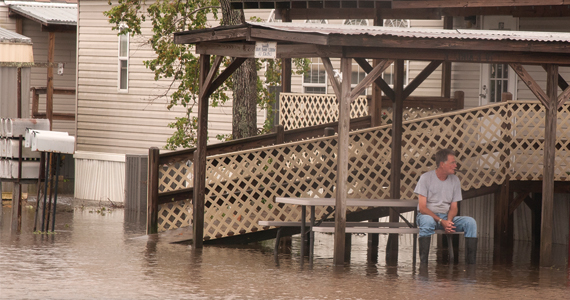
August 30, 2012—A resident of Pointe a la Hache, LA, sits on the stairs of his home that was flooded in the aftermath of Hurricane Isaac. Photo by Patsy Lynch/FEMA
SAMHSA Responds to Recent Disasters
Hurricanes, wildfires, tornados, earthquakes, floods, and severe drought. The United States has recently experienced all of these. No matter the source, a natural disaster or other tragedy can result in anxiety, anger, depression, and other difficult emotions. And those reactions don’t just occur among the people living in the affected area. Their family members and friends, first responders, and rescue and recovery workers are also at risk of experiencing distressing reactions.
SAMHSA’s Disaster Distress Helpline can provide immediate assistance to anyone who needs help after a disaster. Available 24 hours a day, 7 days a week, from anywhere in the United States, the free helpline offers confidential, multilingual counseling by trained professionals as well as referrals and other support services.
To access the toll-free helpline, call 1–800–985–5990 or text TalkWithUs to 66746. The TTY for callers who are deaf or hearing impaired is 1–800–846–8517.
“With community and family support, most of us bounce back after a disaster,” said SAMHSA Administrator Pamela S. Hyde, J.D. “But some may need extra assistance to cope with unfolding events and uncertainties.”
The Disaster Distress Helpline is the nation’s first permanent hotline dedicated to providing disaster-related crisis counseling. The helpline connects callers to staff from the closest crisis counseling center in a nationwide network.
The helpline is just one part of a portfolio of other disaster response activities from SAMHSA. In fact, responding to behavioral health needs after disasters is one of SAMHSA’s key missions.
“Behavioral health is essential to health, which also makes it an integral part of helping Americans overcome disasters,” said Administrator Hyde. “When disaster strikes, it is critical that people and communities get the tools and resources they need as soon as possible so that they can begin the recovery process.”
In addition to responding to disasters, SAMHSA helps states, territories, tribes, and local entities prepare in advance and provide effective, comprehensive behavioral health services after a disaster occurs. SAMHSA also offers technical assistance, training, expert consultation, and information exchange. The SAMHSA-funded Disaster Technical Assistance Center supports these and other disaster-related efforts.
For more information see Disaster Response Resources.
Selected Disaster Response Resources
For more disaster-related publications, visit the SAMHSA store at www.store.samhsa.gov.